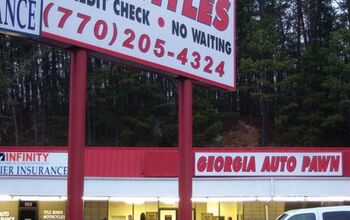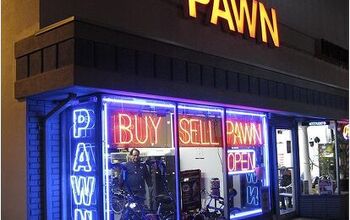Hammer Time: Title Pawn Cons
0%. Sounds good doesn’t it? The title pawn billboard clearly showed that big beautiful numerical goose egg with some illegible lettering underneath a mini-asterisk. “Interesting?” I thought. Since I was stuck in Atlanta with my 17th traffic jam of the week, I decided to give the place a call and see how good the deal really was.
Well the 0% was good for balances over $2500… for 30 days. Then there were fees. Then a recalculation of the smaller balance. Finally I just got ticked off after over a minute’s worth of recalculations and doubletalk, “Let’s say I come by and get a $1000 loan. How much interest would I pay the first month?”. The answer came out to 17.6%.
If this sounds ridiculous keep in mind that virtually every other financial instrument has the opportunity for similar shell games. Credit cards, retail banking, even the pawn down the street may have a contract written in a tiny font filled with legal disclaimers and financial re-claimers. The rates are also deceptive. Any interest rate can be pushed up to the stratosphere with the right penalty, fee or even a change in your credit rating. Regulations may help… or not. But so long as there are politicians to be paid off and special interests to be ‘considered’, the game of consumer financing really won’t change that much. So what to do?
I think part of the answer lies in reducing the financial risks for both sides of the transaction. In the case of the title pawns, they are lending out money with little more than a signed paper and a highly mobile asset as collateral. Folks can take off for the next state or beyond. Switch cars with a friend. Even just keep the car in the garage or a repair shop.
Some counties are actually helpful in allowing the title pawns to access these vehicles after the loan is in default. To intentionally hide a vehicle with a lien on it is considered, ‘theft by conversion’, and a warrant can be issued for the debtor’s arrest. The law at least seems to be on the lender’s side which is what’s to be expected since their lobbyists often help write much of it on a state level. But that’s not the whole story.
Many of these companies are either unaware of the law or unwilling to follow through on it. Judge’s can be very ‘technical’, and many of the more successful firms are leery of damaging their business with bad publicity. If you have a company that has thousands of absconders, and tens of thousands of good customers, you don’t want to sully up your reputation. It’s better in many cases where the stakes are small to let the repo companies do their work. So the cat and mouse game of reclaiming vehicles can go for days, months, or years.
But what if each one of these vehicles had a GPS on it? What if the debtor had to sign in big bold letters that the car would have the system installed (most take less than a few minutes to install) and that they would in turn be given a lower interest rate? GPS systems and disablers are commonly used in the auto finance business. I think they would also work very well in the title pawn business. Especially in those many cases where there is a lot of money at stake.
Then you also have the issue of maintenance and repairs. For a lot of title pawn companies this is a non-starter since this could seemingly open a Pandora’s box of legal issues. But that’s just not so. Judging from what I have seen, a lot of folks who bring their vehicles to a title pawn really need to have the oil changed and a few of their fluids checked. To add $50 to the loan and have them go to a quickie lube place for an oil change and independent inspection would add thousands to the bottom line and give both sides a level of security that is akin to a home inspection.
Then you have other fail-safes to consider. A lot of folks are car rich and house poor. It’s amazing to me how so many struggling folks can have more cars than they need. Ten years of undeserving credit can do that. Most title pawns already offer to keep motorcycles inside the store. Why not do the same for vehicles at a storage lot… except offer a lower interest rate in return for a lower level of risk? I honestly don’t know if that would work. But it may be worth testing out.
Finally, you have the 800 lb gorillas to consider. The interest rate. The term of the loan. The fees.
A lot of consumers believe that regulation will help ‘rein in’ this side of the business. Perhaps. Perhaps not. But the numbers are really just a few choice ingredients in the recipe. The deal can be extremely sweet for one side (300+% interest, plus fees, no loan limits, no equity for the owner after a repo) or it can be a sour and unprofitable deal (5% monthly interest, no fees, no realistic opportunity to reclaim hidden property). Regulation in practice has to cover the trust issues associated with lending and not just the financial ones.
As far as numbers go, I would encourage title pawn companies to have the same opportunities for an interest rate as any other pawn. If a pawn shop can charge a 300+% APR on a loan, so can the title pawn. But I would offer three counterbalances to this.
The first is that the highest annual APR charged should be advertised at the very front of the store in easily legible numbers so that folks know exactly what they’re getting into. If the pawn wants to offer a lower rate for some special case… that’s fine. But the highest possible interest rate should be a known commodity before the customer walks in the door.
As for fees, it’s more than fine to charge for repo and administrative fees. Even Carmax charges $149 in ‘processing fees’ when a customer buys their car. But the interest rate should reflect the level of risk that comes with serving this clientele before the repo. I despise the tactics certain banks use to make people pay the equivalent of 2000+% interest in their checking accounts. If a firm can charge a very high interest rate, they should easily be able to use that rate to reflect the costs of their business.
Finally you have the question of the length of the loan… and whether part of the principal should be reflected in the monthly payment that is due. Consumer advocates encourage a 9 to 12 month time frame with part of the principal paid off in the amount due each month. The lobbyists du jour in the title pawn industry usually push for interest only loans with no limits on the length of the loan. I prefer a 24 month period with no prepayment penalities and a straight-line method for paying off the principal.
Of course I’m not Moses offering all my readers a Godly sermon on the mount. I don’t have all the answers or even half the questions. But every customer, even the math challenged, should know exactly what they’re buying beforehand. The folks getting these loans shouldn’t be riddled with gotchas.
Likewise the companies offering the loans should be able to protect and monitor their collateral. The ones looking to government regulation are simply not seeing the entire picture. Regulations in this country are like building a sand castle with your bare hands. In the end the right politicians get paid off and everyone continues to play the shell game. It leads to deceptiveness and distrust, and so long as companies and customers can play those games the destructiveness that comes with this distrust will continue.
More by Steven Lang
Latest Car Reviews
Read moreLatest Product Reviews
Read moreRecent Comments
- Kjhkjlhkjhkljh kljhjkhjklhkjh A prelude is a bad idea. There is already Acura with all the weird sport trims. This will not make back it's R&D money.
- Analoggrotto I don't see a red car here, how blazing stupid are you people?
- Redapple2 Love the wheels
- Redapple2 Good luck to them. They used to make great cars. 510. 240Z, Sentra SE-R. Maxima. Frontier.
- Joe65688619 Under Ghosn they went through the same short-term bottom-line thinking that GM did in the 80s/90s, and they have not recovered say, to their heyday in the 50s and 60s in terms of market share and innovation. Poor design decisions (a CVT in their front-wheel drive "4-Door Sports Car", model overlap in a poorly performing segment (they never needed the Altima AND the Maxima...what they needed was one vehicle with different drivetrain, including hybrid, to compete with the Accord/Camry, and decontenting their vehicles: My 2012 QX56 (I know, not a Nissan, but the same holds for the Armada) had power rear windows in the cargo area that could vent, a glass hatch on the back door that could be opened separate from the whole liftgate (in such a tall vehicle, kinda essential if you have it in a garage and want to load the trunk without having to open the garage door to make room for the lift gate), a nice driver's side folding armrest, and a few other quality-of-life details absent from my 2018 QX80. In a competitive market this attention to detai is can be the differentiator that sell cars. Now they are caught in the middle of the market, competing more with Hyundai and Kia and selling discounted vehicles near the same price points, but losing money on them. They invested also invested a lot in niche platforms. The Leaf was one of the first full EVs, but never really evolved. They misjudged the market - luxury EVs are selling, small budget models not so much. Variable compression engines offering little in terms of real-world power or tech, let a lot of complexity that is leading to higher failure rates. Aside from the Z and GT-R (low volume models), not much forced induction (whether your a fan or not, look at what Honda did with the CR-V and Acura RDX - same chassis, slap a turbo on it, make it nicer inside, and now you can sell it as a semi-premium brand with higher markup). That said, I do believe they retain the technical and engineering capability to do far better. About time management realized they need to make smarter investments and understand their markets better.


































Comments
Join the conversation
Oops! I meant to reply to the K-car post. Sorry everybody. Re Title pawns - We'll soon have a new cop on the beat, Elizabeth Warren. The title pawn industry as we know it today will cease to exist.
"But what if each one of these vehicles had a GPS on it?" I wonder if they don't make the borrower install a GPS unit? I know alot of the low end buy here/pay here used car dealers install GPS units in the cars which disable the cars if you don't make a payment (and No they only disable the car after it is parked and turned off). They then have a keypad for the borrower to punch in a reset number to turn on the car again upon payment of the money owed. This unit also allows the dealer to track the car for recovery if the payments are not made.